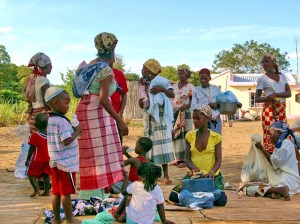 How many children do the urban poor women in the West African country of Burkina Faso really want? A recent study presented at the annual meeting of the Population Association of America addressed the fertility preferences of poor women living in the city of Ouagadougou. It found that they wanted large families, but that they face obstacles to raising the four or five children they hoped to have.
How many children do the urban poor women in the West African country of Burkina Faso really want? A recent study presented at the annual meeting of the Population Association of America addressed the fertility preferences of poor women living in the city of Ouagadougou. It found that they wanted large families, but that they face obstacles to raising the four or five children they hoped to have.
The study, conducted using face-to-face interviews as well as census data, discovered that when women say they “don’t want to get pregnant,” it is not because they do not want children, but because they feel insecure in some way. The women gave reasons ranging from political instability, lack of partner commitment, job instability, and food insecurity for wanting to postpone childbearing. These concerns shouldn’t be too much of a surprise, considering Burkina Faso is one of the world’s poorest nations.
When asked how many children she wanted, one forty-year old woman with two children said “there are questions of health, and if you have five or six children without a good job, how are you going to feed them? . . . if parents are able to support their children until they get a good job, everything becomes easy.”
“I want children, but I won’t have them until I can care for them,” is the general attitude.
Women in Burkina Faso state their desired fertility as five children. On average, the women in Burkina Faso give birth to six children, but about one out of six children in Burkina Faso dies before his/her fifthth birthday.
In the words of the study: “Individuals experience conflicted fertility preferences, both realizing the high costs of children in the city and the constraints imposed by their poverty, but still believing that a large family brings substantial benefits [Italics added]. . . We show how these conflicted preferences are expressed by poor women in a survey by a higher current desire to avoid pregnancy, which contrasts with a relatively lower all-time demand for pregnancy prevention”[Italics in original].
When the poor women of urban Ouagadougou say “I really want a large family but, if I have to, I’ll postpone having children,” the population controllers only hear the word “postpone,” and ship in contraceptives.
Not only does the international population control movement impose its own fertility preferences on the rest of the world, but it also simply ignores anyone who doesn’t agree with their views. Women and families in developing African nations have consistently said, “We want improved nutrition, clean water, and adequate health services,” yet the population control bureaucrats keep handing them are condoms and injections of Depo-Provera.
The study stated that women in Burkina Faso can get to health clinics when they need to: “Poor women and couples do a great job, at least in Ouagadougou, at delivering in hospitals and at vaccinating their children.” Since contraceptives are prevalent in Burkina Faso health clinics, contraceptives are certainly acceptable. The study then deduces its core observation into a single sentence: “To go one step further, some of what has been categorized as obstacles to family planning services may be in fact better grasped as the expression of weakly held motivations to avoid pregnancies.”
In other words, population controllers, the women of Burkina Faso do not want what you are selling!
Yet population control groups refuse to believe that women anywhere can be happy until they have small families. That is why the United Nations Population Fund spent 9.3 million on programmes such as “population dynamics” and contraception in Burkina Faso during 2012.
The women and children in Burkina Faso have a high unmet need for food, water, and stability. For artificial contraception, not so much.




